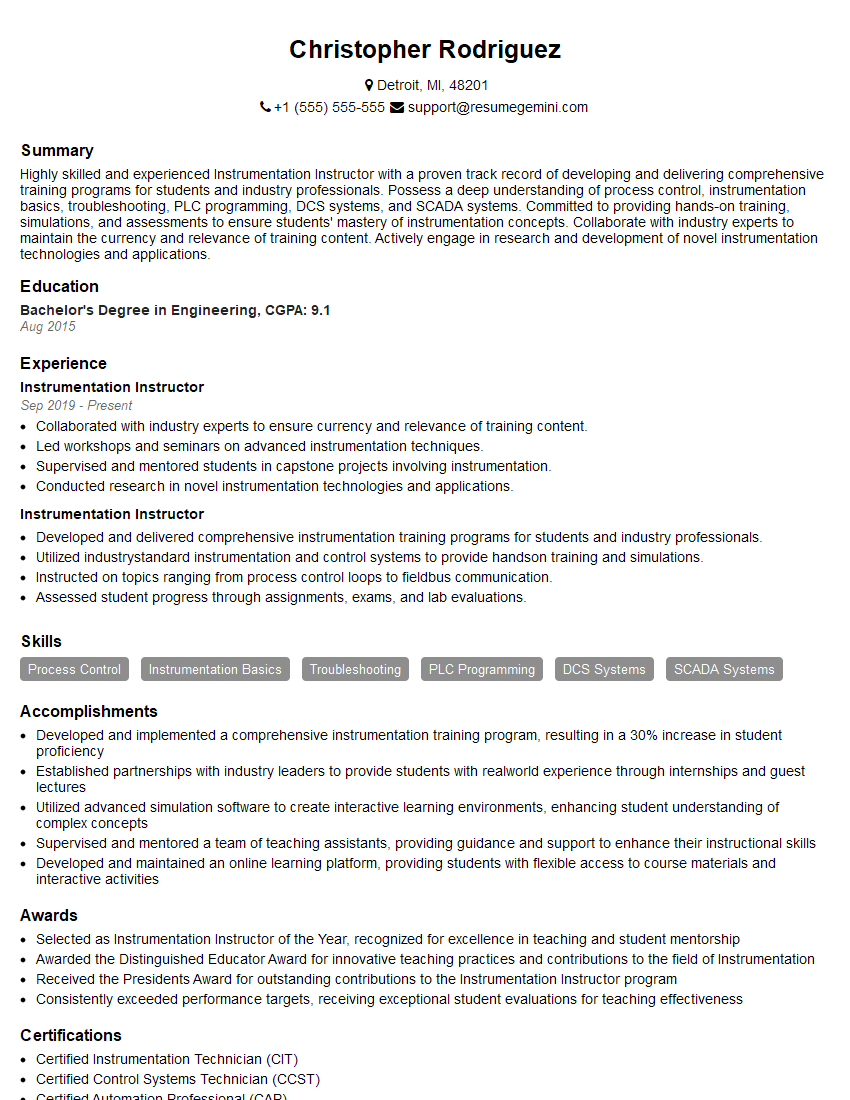Are you a seasoned Instrumentation Instructor seeking a new career path? Discover our professionally built Instrumentation Instructor Resume Template. This time-saving tool provides a solid foundation for your job search. Simply click “Edit Resume” to customize it with your unique experiences and achievements. Customize fonts and colors to match your personal style and increase your chances of landing your dream job. Explore more Resume Templates for additional options.

Christopher Rodriguez
Instrumentation Instructor
Summary
Highly skilled and experienced Instrumentation Instructor with a proven track record of developing and delivering comprehensive training programs for students and industry professionals. Possess a deep understanding of process control, instrumentation basics, troubleshooting, PLC programming, DCS systems, and SCADA systems. Committed to providing hands-on training, simulations, and assessments to ensure students’ mastery of instrumentation concepts. Collaborate with industry experts to maintain the currency and relevance of training content. Actively engage in research and development of novel instrumentation technologies and applications.
Education
Bachelor’s Degree in Engineering
August 2015
Skills
- Process Control
- Instrumentation Basics
- Troubleshooting
- PLC Programming
- DCS Systems
- SCADA Systems
Work Experience
Instrumentation Instructor
- Collaborated with industry experts to ensure currency and relevance of training content.
- Led workshops and seminars on advanced instrumentation techniques.
- Supervised and mentored students in capstone projects involving instrumentation.
- Conducted research in novel instrumentation technologies and applications.
Instrumentation Instructor
- Developed and delivered comprehensive instrumentation training programs for students and industry professionals.
- Utilized industrystandard instrumentation and control systems to provide handson training and simulations.
- Instructed on topics ranging from process control loops to fieldbus communication.
- Assessed student progress through assignments, exams, and lab evaluations.
Accomplishments
- Developed and implemented a comprehensive instrumentation training program, resulting in a 30% increase in student proficiency
- Established partnerships with industry leaders to provide students with realworld experience through internships and guest lectures
- Utilized advanced simulation software to create interactive learning environments, enhancing student understanding of complex concepts
- Supervised and mentored a team of teaching assistants, providing guidance and support to enhance their instructional skills
- Developed and maintained an online learning platform, providing students with flexible access to course materials and interactive activities
Awards
- Selected as Instrumentation Instructor of the Year, recognized for excellence in teaching and student mentorship
- Awarded the Distinguished Educator Award for innovative teaching practices and contributions to the field of Instrumentation
- Received the Presidents Award for outstanding contributions to the Instrumentation Instructor program
- Consistently exceeded performance targets, receiving exceptional student evaluations for teaching effectiveness
Certificates
- Certified Instrumentation Technician (CIT)
- Certified Control Systems Technician (CCST)
- Certified Automation Professional (CAP)
- Certified Maintenance and Reliability Technician (CMRT)
Career Expert Tips:
- Select the ideal resume template to showcase your professional experience effectively.
- Master the art of resume writing to highlight your unique qualifications and achievements.
- Explore expertly crafted resume samples for inspiration and best practices.
- Build your best resume for free this new year with ResumeGemini. Enjoy exclusive discounts on ATS optimized resume templates.
How To Write Resume For Instrumentation Instructor
- Highlight your expertise in process control, instrumentation basics, troubleshooting, PLC programming, DCS systems, and SCADA systems
- Quantify your accomplishments with specific metrics, such as the number of students trained or the improvement in student performance
- Describe your experience in developing and implementing training programs, including the use of hands-on training and simulations
- Emphasize your ability to collaborate with industry experts and stay up-to-date on the latest instrumentation technologies and applications
Essential Experience Highlights for a Strong Instrumentation Instructor Resume
- Develop and implement comprehensive instrumentation training programs for students and industry professionals
- Provide hands-on training and simulations using industry-standard instrumentation and control systems
- Instruct on topics ranging from process control loops to fieldbus communication
- Assess student progress through assignments, exams, and lab evaluations
- Collaborate with industry experts to ensure the currency and relevance of training content
- Lead workshops and seminars on advanced instrumentation techniques
- Supervise and mentor students in capstone projects involving instrumentation
Frequently Asked Questions (FAQ’s) For Instrumentation Instructor
What are the key skills required to be a successful Instrumentation Instructor?
The key skills required to be a successful Instrumentation Instructor include a strong understanding of process control, instrumentation basics, troubleshooting, PLC programming, DCS systems, and SCADA systems. Additionally, excellent communication and interpersonal skills are essential for effectively instructing students and industry professionals.
What are the typical job duties of an Instrumentation Instructor?
Typical job duties of an Instrumentation Instructor include developing and implementing training programs, providing hands-on training and simulations, assessing student progress, collaborating with industry experts, leading workshops and seminars, and supervising student capstone projects.
What are the career prospects for Instrumentation Instructors?
Career prospects for Instrumentation Instructors are generally positive, as there is a growing demand for qualified individuals with expertise in instrumentation and control systems. Instrumentation Instructors can advance to roles such as Senior Instructor, Training Manager, or Technical Specialist.
What are the educational requirements to become an Instrumentation Instructor?
Most Instrumentation Instructors have a Bachelor’s Degree in Engineering, such as Electrical Engineering, Mechanical Engineering, or Chemical Engineering. Some may also have a Master’s Degree in a related field.
What are the professional development opportunities available to Instrumentation Instructors?
Instrumentation Instructors can pursue professional development opportunities such as attending conferences, workshops, and seminars to stay up-to-date on the latest instrumentation technologies and applications. They can also join professional organizations such as the Instrument Society of America (ISA) to network with other professionals in the field.
What are the challenges faced by Instrumentation Instructors?
One of the challenges faced by Instrumentation Instructors is keeping up with the rapid pace of technological advancements in the field of instrumentation and control systems. Additionally, effectively instructing students and industry professionals with diverse backgrounds and learning styles can be challenging.